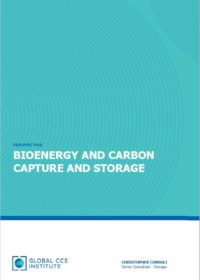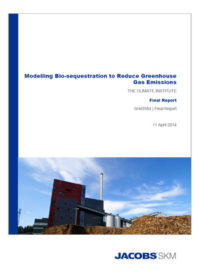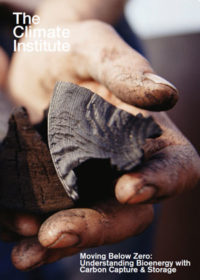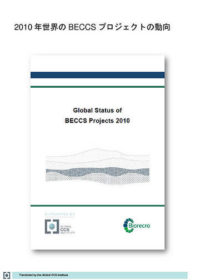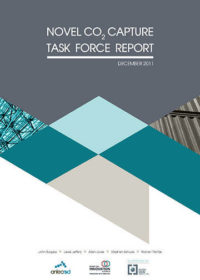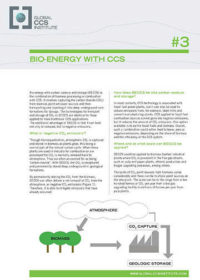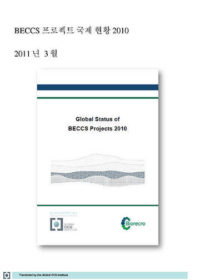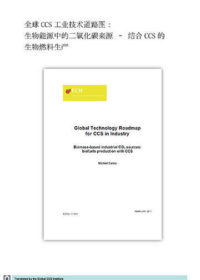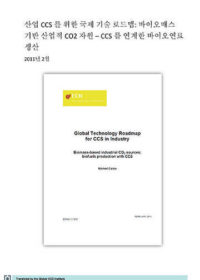Resources
Publications
Our publications, reports and research library hosts over 500 specialist reports and research papers on all topics associated with CCS.
View our Publication Library Disclaimer.
Filter by
Bioenergy and Carbon Capture and Storage
14th March 2019
Organisation(s): Global CCS Institute
Topic(s): Bioenergy with carbon capture and storage (BECCS), Biofuels / Bioenergy, Negative emissions technologies
After almost thirty years of climate change negotiations, global CO2 levels are still rising (NOAA, 2018). The UNFCCC Paris Agreement goals of holding global warming to ‘well-below’ 2°C and to ‘pursue efforts’ to limit it to 1.5°C are in stark contrast to the ever-dwindling carbon budget.
The evidence makes it clear. CO2 needs to be removed from the atmosphere, known as carbon dioxide removal (CDR), using negative emissions technologies (NETs) to meet global warming targets. Bioenergy with carbon capture and storage (BECCS) is emerging as the best solution to decarbonise emission-intensive industries and sectors and enable negative emissions.
This Perspective from Christopher Consoli, Senior Consultant - Storage, explores this technology and its deployment as a climate mitigation solution.
Financing BECCS in developing countries
11th February 2019
Organisation(s): Global CCS Institute
Topic(s): Bioenergy with carbon capture and storage (BECCS), Bioethanol, Project financing
Bioenergy with carbon capture and storage (BECCS) is a promising class of technologies for carbon dioxide (CO2) removal and consists of the capture and permanent geological storage of CO2 stemming from biomass transformation or combustion. Several industrial sectors can implement this technology, including the biofuel sector which is predominantly made up of bioethanol production. Bioethanol is one of the few renewable alternatives to oil and gas-based liquid fuel, with which it can be easily blended to be used as a transportation fuel.
As countries seek to decarbonise transport, demand for bioethanol is set to grow globally. By integrating CCS into the production process for bioethanol, negative emissions can be created. It is forecast that a significant proportion of the world’s bioethanol production will come from developing countries (International Energy Agency, 2018).
This brief focuses on how the production of bioethanol with CCS can be supported by climate finance providers, and the pivotal role Brazil can play in facilitating this process.
Modelling bio-sequestration to reduce greenhouse gas emissions
11th April 2014
Topic(s): Bioenergy with carbon capture and storage (BECCS), Carbon capture use and storage (CCUS)
The focus of this study is on the role that bioenergy carbon capture and storage (BECCS) technology can play in achieving long term ambitions to reduce emissions. This report describes the assumptions and methods used to determine the impact of adoption of BECCS in the power sector and for large applications entailing direct combustion. A number of scenarios were modelled with and without the availability of BECCS to determine the relative contribution of BECCS. The results of the modelling are discussed in this report.
Disclaimer
The content within the Global CCS Institute Publications, Reports and Research Library is provided for information purposes only. We make every effort and take reasonable care to keep the content of this section up-to-date and error-free. However, we make no claim as to its accuracy, currency or reliability.
Content and material featured within this section of our website includes reports and research published by third parties. The content and material may include opinions and recommendations of third parties that do not reflect those held by the Global CCS Institute.
Moving below zero: understanding bioenergy with carbon capture & storage
9th April 2014
Topic(s): Bioenergy with carbon capture and storage (BECCS), Carbon capture use and storage (CCUS)
This report describes an in-depth national study of bioenergy with carbon capture and storage (also known as bio-CCS, BECCS or renewable-CCS), with a focus on Australia. The authors - The Climate Institute - seek to identify the implications for an economy to meet ambitious climate goals with and without bio-CCS.
This project was conducted with support from the Global CCS Institute.
Disclaimer
The content within the Global CCS Institute Publications, Reports and Research Library is provided for information purposes only. We make every effort and take reasonable care to keep the content of this section up-to-date and error-free. However, we make no claim as to its accuracy, currency or reliability.
Content and material featured within this section of our website includes reports and research published by third parties. The content and material may include opinions and recommendations of third parties that do not reflect those held by the Global CCS Institute.
2010年世界のBECCSプロジェクトの動向
2nd August 2012
Topic(s): Bioenergy with carbon capture and storage (BECCS), Carbon capture use and storage (CCUS)
BECCS(Bio-Energy with Carbon Capture and Storage)は、CO2回収貯留(CCS)とバイオマスの処理又は燃焼を組み合わせた技術である。この技術は、バイオマス由来のCO2排出点源にCCS技術を適用するものであり、化石燃料へのCCSに用いられるCO2の輸送及び貯留技術とおおむね同様の技術を利用している。
BECCSは、大気中のCO2の恒久的な純減(科学用語でいうネガティブCO2排出)を実現するものである。この観点から、この技術は一時的なCO2シンクの創出や、大気中への排出の削減のみを行う他の多くの削減技術と一線を画している。
本報告書は、世界各地で初めて実施されるBECCSプロセスの導入を目指す16件のプロジェクトについて記載している。このうち4件は、様々な理由により試行段階のままである。成熟度は異なるものの、7件が調査及び計画段階に入っている。3件の施設が現在建設中で、2011年に操業開始の予定である。また、1件は既に操業中で、研究用パイロットプロジェクトも既に1件完了している。これらのプロジェクトは主に欧州や北米で実施されているが、BECCSシステムの大半は今後、南米、アジア、アフリカにおいて導入されることが予想される。
Disclaimer
The content within the Global CCS Institute Publications, Reports and Research Library is provided for information purposes only. We make every effort and take reasonable care to keep the content of this section up-to-date and error-free. However, we make no claim as to its accuracy, currency or reliability.
Content and material featured within this section of our website includes reports and research published by third parties. The content and material may include opinions and recommendations of third parties that do not reflect those held by the Global CCS Institute.
Novel CO2 capture taskforce report
1st December 2011
Topic(s): Bioenergy with carbon capture and storage (BECCS), Carbon capture use and storage (CCUS), CO2 storage
A portfolio of low‑carbon technologies are required to be developed to reach Government targets for CO2 emissions. A large proportion of Australia’s electrical energy is generated using coal and there is an increasing use of natural gas. Geological sequestration of CO2 from these fossil sources is being extensively studied in Australia. The present study was convened by the sponsors BCIA, ANLEC and the Global CCS Institute to investigate CO2 capture and storage by means alternative to geological storage. The technologies for novel CO2 capture considered by the Task Force fall into the areas of bio‑sequestration and mineral sequestration
Disclaimer
The content within the Global CCS Institute Publications, Reports and Research Library is provided for information purposes only. We make every effort and take reasonable care to keep the content of this section up-to-date and error-free. However, we make no claim as to its accuracy, currency or reliability.
Content and material featured within this section of our website includes reports and research published by third parties. The content and material may include opinions and recommendations of third parties that do not reflect those held by the Global CCS Institute.
Bio-energy with CCS
24th November 2011
Topic(s): Bioenergy with carbon capture and storage (BECCS), Carbon capture use and storage (CCUS)
A short factsheet developed by the Global CCS Institute, which explains the concept of combining the use of bio-energy with CCS in order to achieve negative emissions and includes a brief review of such projects around the world.
Disclaimer
The content within the Global CCS Institute Publications, Reports and Research Library is provided for information purposes only. We make every effort and take reasonable care to keep the content of this section up-to-date and error-free. However, we make no claim as to its accuracy, currency or reliability.
Content and material featured within this section of our website includes reports and research published by third parties. The content and material may include opinions and recommendations of third parties that do not reflect those held by the Global CCS Institute.
Potential for biomass and carbon dioxide capture and storage
28th July 2011
Topic(s): Bioenergy with carbon capture and storage (BECCS), Carbon capture use and storage (CCUS)
The aim of this study is to fill these knowledge gaps and provide a first order assessment of the potential for BE-CCS technologies to 2050, with an additional focus on the medium term, i.e. 2020 to 2030. We make a distinction between technical potential (the potential that is technically feasible and not restricted by economical limitations), realisable potential1 (the potential that is technically feasible and takes future energy demand and scenarios for capital stock turnover into account) and economic potential (the potential at competitive cost compared to alternatives). The difference between these potentials can be large and it is therefore imperative to understand these differences and identify the restrictions that constrain the deployment of the full potential. Next to quantitative estimates of these potentials, in the form of regional and global supply curves, we present recommendations to overcome the possible deployment obstacles and enhance drivers to stimulate the deployment of BE-CCS technologies.
Disclaimer
The content within the Global CCS Institute Publications, Reports and Research Library is provided for information purposes only. We make every effort and take reasonable care to keep the content of this section up-to-date and error-free. However, we make no claim as to its accuracy, currency or reliability.
Content and material featured within this section of our website includes reports and research published by third parties. The content and material may include opinions and recommendations of third parties that do not reflect those held by the Global CCS Institute.
BECCS 프로젝트 국제 현황 2010
1st March 2011
Topic(s): Bioenergy with carbon capture and storage (BECCS), Carbon capture use and storage (CCUS)
Disclaimer
The content within the Global CCS Institute Publications, Reports and Research Library is provided for information purposes only. We make every effort and take reasonable care to keep the content of this section up-to-date and error-free. However, we make no claim as to its accuracy, currency or reliability.
Content and material featured within this section of our website includes reports and research published by third parties. The content and material may include opinions and recommendations of third parties that do not reflect those held by the Global CCS Institute.
Global technology roadmap for CCS in industry. Biomass-based industrial CO2 sources: biofuels production with CCS
1st February 2011
Topic(s): Bioenergy with carbon capture and storage (BECCS), Carbon capture use and storage (CCUS)
The United Nations Industrial Development Organisation and the International Energy Agency are developing a Global Technology Roadmap for CCS in Industry (the Roadmap), due to be released mid–year. The project has been sponsored by the Global CCS Institute and the Norwegian Ministry of Petroleum and Energy.
The Roadmap will be a valuable resource to stakeholders, including policy makers and regulators, across the globe. Targeted at policymakers, the Roadmap will be a high-level assessment of the key actions and milestones that need to be undertaken to develop CCS in Industry.
The following in-depth, technical sectoral assessments have been undertaken to inform the direction of the Roadmap.
- Biomass
- High-purity
- Iron and Steel
- Refineries
- Cement
- Enhanced Oil Recovery
Disclaimer
The content within the Global CCS Institute Publications, Reports and Research Library is provided for information purposes only. We make every effort and take reasonable care to keep the content of this section up-to-date and error-free. However, we make no claim as to its accuracy, currency or reliability.
Content and material featured within this section of our website includes reports and research published by third parties. The content and material may include opinions and recommendations of third parties that do not reflect those held by the Global CCS Institute.
全球CCS工业技术道路图:生物能源中的二氧化碳来源 – 结合CCS的生物燃料生产
1st February 2011
Topic(s): Bioenergy with carbon capture and storage (BECCS), Carbon capture use and storage (CCUS)
最近的2020和2050项目(IEA 2009b; IEA, 2010)表明,利用CCS的生物燃料生产的贡献,对于在制造业和生物燃料生产的生物量基础的CCS总体份额,所占份量到目前为止是最为巨大的。因此,对于结合CCS的一系列生物燃料生产的概念将会在这次调查中展开更为具体的讨论。
Disclaimer
The content within the Global CCS Institute Publications, Reports and Research Library is provided for information purposes only. We make every effort and take reasonable care to keep the content of this section up-to-date and error-free. However, we make no claim as to its accuracy, currency or reliability.
Content and material featured within this section of our website includes reports and research published by third parties. The content and material may include opinions and recommendations of third parties that do not reflect those held by the Global CCS Institute.
산업 CCS를 위한 국제 기술 로드맵: 바이오매스 기반 산업적 CO2 자원 – CCS를 연계한 바이오연료 생산
1st February 2011
Topic(s): Bioenergy with carbon capture and storage (BECCS), Carbon capture use and storage (CCUS)
Disclaimer
The content within the Global CCS Institute Publications, Reports and Research Library is provided for information purposes only. We make every effort and take reasonable care to keep the content of this section up-to-date and error-free. However, we make no claim as to its accuracy, currency or reliability.
Content and material featured within this section of our website includes reports and research published by third parties. The content and material may include opinions and recommendations of third parties that do not reflect those held by the Global CCS Institute.
